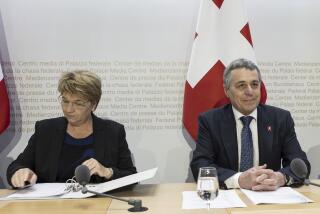Israelis on 1st Official Soviet Visit in 20 Years
- Share via
MOSCOW — The first official Israeli delegation to the Soviet Union in more than 20 years arrived here Thursday to expand the growing dialogue between Jerusalem and Moscow.
“The very fact of our arrival here may and should be seen as a change in the relations between our countries,” Meron Gordon, the delegation leader, told newsmen at Moscow’s Sheremetyevo Airport. “It was unthinkable several years ago. I hope it is the beginning of something bigger, but that’s only a hope.”
With no diplomatic relations since the 1967 Arab-Israeli War and sharply critical of each other through most of the intervening years, Israel and the Soviet Union have been slowly moving toward not just restored relations but a working relationship that could help stabilize the Middle East.
Yeshayahu Anug, deputy director general of the Israeli Foreign Ministry, said in Jerusalem before the delegation left that the trip is a “step in a promising direction,” though not “a decisive step to realize normal relations in a short time.”
“The atmosphere is promising,” Anug said, “but we don’t intend to conquer the Soviet Union in one day.”
Official Focus on Visas
Officially, the six-member Israeli delegation has come to review the way Israeli affairs--largely the issuance of visas to emigrating Soviet Jews--are handled by the Dutch Embassy on Jerusalem’s behalf.
While Israeli officials have acknowledged the “consular” and “technical” nature of the trip for which the delegation was granted two-month visas, Jerusalem has also made clear its hope that it will become a major step toward restoring diplomatic relations between the two countries.
On Thursday, a Soviet Foreign Ministry spokesman, Vadim Perfilyev, restated Moscow’s position that Arab-Israeli peace talks are a prerequisite for re-establishing diplomatic relations between the two countries. Moscow broke relations at the time of the 1967 Arab-Israeli War.
“This visit is not related to the problem of Soviet-Israeli relations, just as the visit of our consular group to Israeli has no connection to this question,” Perfilyev said, noting that a similar Soviet delegation has been in Israel for a year. “They will be handling technical matters.”
The Israelis said before leaving Jerusalem that a major goal of the mission would be establishing relations with the Jewish community here. They will start by joining Sabbath prayers at Moscow’s main synagogue this evening in Moscow.
Meeting With Jews
“First and foremost we will be meeting with Jews,” Gordon said before leaving Jerusalem. “On Friday evening, we will be in the synagogue for Sabbath evening prayers, and this is certainly going to be exciting.”
They plan to continue by making themselves highly visible among Soviet Jews, most of whom are choosing to emigrate to the United States and Europe instead of Israel.
The visit will be especially emotional for two of the Israelis. Gordon, 41, the delegation head, left the Soviet Union at the age of 10, and Yaacov Kedmi, 43, is a former Soviet Jewish dissident who emigrated nearly 20 years ago.
“We are both very moved,” Gordon said on Israeli television. “When we left there, we were young. I don’t think either of us ever thought we could return to the Soviet Union--certainly not as official representatives of Israel.”
But Israeli officials see new flexibility in the Soviet position on Middle East issues, and they take Moscow’s acceptance of a consular delegation, although delayed a year, as evidence of this.
Israel Right to Exist
One change has been formal Soviet assertion of the need by Arabs for recognition not only of Israel’s right to exist but for security as the basis of any peace settlement in the Middle East.
Western diplomats also say that Moscow appears to have dropped its earlier insistence on creation of an independent Palestinian state as part of an overall settlement of the Arab-Israeli conflict and may be open to other proposals.
Israeli officials acknowledge a more conciliatory Soviet approach, apparently based on a more realistic reading of Jerusalem’s position and a desire to draw Syrians, the Palestine Liberation Organization and other Arabs into an international peace conference on the Middle East next year.
The Kremlin has relaxed its conditions for the re-establishment of diplomatic relations to the point where they could be renewed on the first day of a Middle East peace conference, and Soviet diplomats say they think that this policy could be eased further.
Until recently, Moscow demanded that Israel had to leave all Arab territories it seized in the 1967 war before it would consider a restoration of diplomatic relations, though it had strongly supported the establishment of the Jewish state in 1948 and was one of the first countries to recognize it.
Shamir’s Opposition
Israeli Prime Minister Yitzhak Shamir is opposed to such an international conference on the Middle East, and Soviet officials say that real progress depends on the outcome of the Israeli elections later this year. The Soviet Union, as a permanent member of the U.N. Security Council, would participate in the proposed conference.
Israeli officials, assessing relations with Moscow, have also noted increased Jewish emigration from the Soviet Union, a decline in anti-Israeli propaganda from here, more family visits between Israeli and Soviet citizens, Soviet performers and films being sent to Israel and more frequent meetings between Israeli and Soviet officials.
“One should not speak of major changes,” Anug said in Jerusalem, reacting to the apparent shifts, “but there are new ideas. . . . The arrival of a delegation of Israelis to the Soviet Union, even with a mandate that is not comprehensive, is a major event at least in the Israeli-Soviet dialogue.”
Although no direct political talks are now planned, Anug said the delegation’s mandate could be expanded and its stay extended, as the Soviet delegation’s stay has been prolonged in Israel.
One sensitive issue on the agenda is the emigration of Soviet Jews, who are now leaving at a sharply increased rate of 1,500 to 2,000 a month but going mostly to the United States and other countries rather than Israel.
Forcing Jews to Israel
Israel is seeking to force all the Jewish emigrants leaving the country on its visas to go first to Israel, but this has been strongly opposed by the Netherlands, the United States and, most recently, the Soviet Union as a violation of human rights.
An Israeli request to allow the delegation to issue visas directly to Soviet emigres while it is in Moscow was turned down by the Soviet authorities, diplomats said.
From January to June, 6,017 Soviet Jews emigrated, but only 840 of them went to Israel, according to the Geneva-based Intergovermental Committee for Migration. Last year, about 10,000 Jews were granted exit visas, a sharp increase over recent years but still a fraction of the 1979 peak of 51,000.
Michael Parks reported from Moscow and Dan Fisher from Jerusalem.
More to Read
Sign up for Essential California
The most important California stories and recommendations in your inbox every morning.
You may occasionally receive promotional content from the Los Angeles Times.










